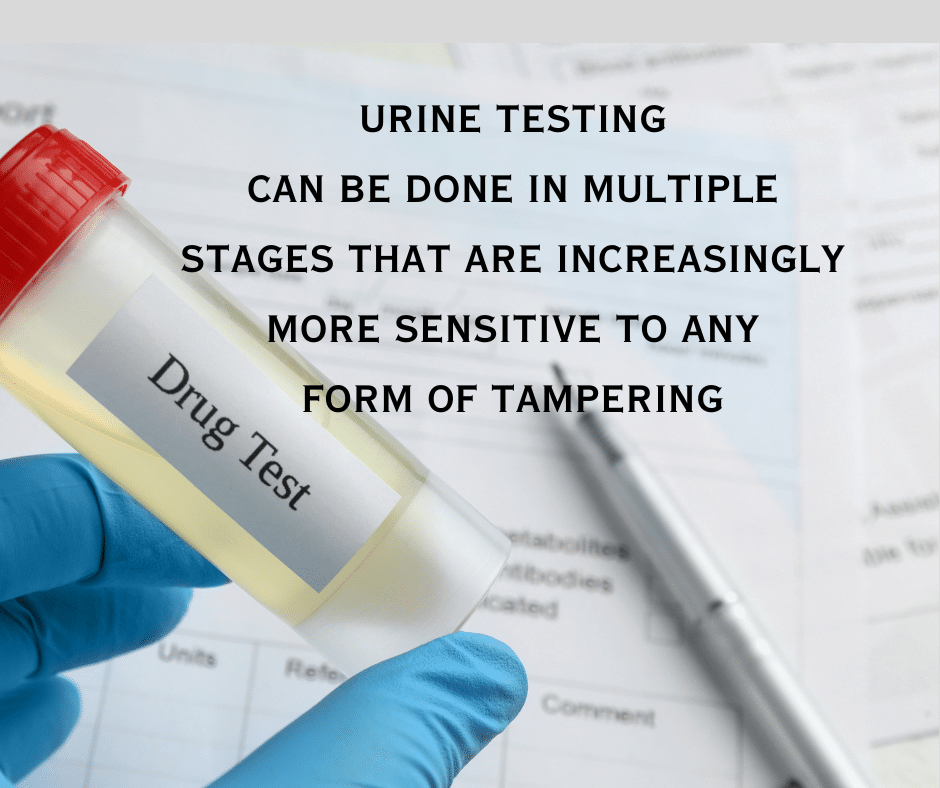Court Ordered Drug & Alcohol Testing — The UA
In the criminal justice world, the urine drug test is abbreviated to UA. Your lawyer, probation, and many others will report whether your UA was positive or negative for substances. It is possible that other types of drug testing can be performed but, due to the cost-effectiveness and non-invasive nature, a urinalysis is most typical.
What Can A Urinalysis or UA Test For
There are types of methods to testing drugs and alcohol in urine. Be aware that testing for criminal courts may vary from employment-type testing.
Alcohol
Many clients want to know how long alcohol will remain detectible in urine. Well, that depends. Alcohol may be detected in urine from 12 hours or up to 5 days after your last drink. There are scientific journals indicating the more specific tests for certain alcohol metabolites can be detected for 7 days but, typically, 3-5 days is more standard.
Traditional Urine Testing
The average test will detect Ethanol in your urine within an hour and up to 12 hours. How long it is detectible will vary based on age, gender, amount of consumption and many more factors.

Non-traditional Testing
Tests intended to detect ethyl glucuronide (EtG) and ethyl sulfate (EtS) may show positive for ethanol ingestion for 3-7 days depending on the quality of the test and certain factors of the test subject.
Obviously, EtG and EtS tests are much more reliable to detect consumption of ethanol and secondary metabolites or biomarkers of ethanol. However, they are more expensive and not typically used. They are more commonly used by substance abuse agencies or court-ordered testing rather than employment testing.
Hair Follicle Testing
Generally speaking, this form of testing is not used in pending misdemeanor cases. However, if you are having a hair test done, be prepared that alcohol is typically detectible for up to 90 days and other substances may be detectible even longer.
Marijuana
Again, the type or sensitivity of test used will determine how long THC will be detected in your urine. However, the most significant determinants if marijuana use is detected will likely be the profile of the user. For example, some of the following factors determine how long THC is stored in your tissue.
An individual’s frequency of use
The amount of THC in the marijuana
The method of use — inhalation vs. ingestion
The user’s body composition (BMI)
The user’s metabolism and excretion rate
For example, if you are overweight and do not engage in exercise that induces sweating and detox, THC is likely more detectable for a longer period. This is because THC is absorbed into organs and fat. While a significant amount is excreted through feces and urine (after processing through the liver), about 15-20% remains stored in the body.
Eventually, if there was no longer any use, the remaining THC would be excreted back into the bloodstream and metabolized in the liver over time. If you exercise and sauna, you likely move this THC out of the fatty tissue faster. However, there is no exact science for how long the excretion will take. This is the reason most reports indicate THC is detectible in the urine for anywhere from 1 day to 30+ days after use. There are simply too many variables to say with certainty how long THC will be detected in the urine tests used by most state-certified chemical dependency agencies.
Fentanyl
If you are being monitored for fentanyl abuse, studies show that it will likely be present in your urine for 1-3 days. Whether it appears as a positive on a test depends on whether the test provider is testing only for the presence of fentanyl or if they also measure its metabolites — norfentanyl and despropionylfentanyl.
Methamphetamine
Methamphetamine can usually be detected in urine for 3-5 days after last use. The test will likely show positive for methamphetamine as well as amphetamine since methamphetamine metabolizes to amphetamine. However, if you are a chronic user, be aware that the drug may show for up to 7 days.
Some people who take ADHD medications, such as Adderall, think they can “beat” the test by claiming the positive amphetamine in the urine is from a prescription medication. It is important to know that, when an initial urine test shows positive for amphetamine, the lab can then run a more sensitive MS test to break down the result to methamphetamine, amphetamine, or positive for both. If positive for any methamphetamine, a third option, a D/L isomers test can be narrow down the root cause of the positive test.
“Beating” The Urine Test
As you can see from the above information, there are simply some drugs that will need to “clear” your system if you want a clean UA. However, if you are seeking a DUI evaluation for your criminal case and the court has ordered you to abstain from drugs and alcohol, it is understandable that residual THC may still appear in your urine due to the length of time to be fully excreted. However, if your urine is positive for alcohol several days after your Arraignment, you could be in big trouble for your positive UA.
If you do test positive for drugs during your chemical dependency evaluation, it is likely that the agency will have you return in a week to make sure you are no longer positive for any substances (giving you the benefit that your body is excreting the substance). However, be aware that the presence of any substance in your urine is likely to increase the odds that the evaluator will determine you have a substance use disorder that requires some treatment (see other blogs on type of treatment that could be recommended).
Do Not Fall For “Tricks” On The Internet
The urine tests for probation or court-ordered evaluations are quite sensitive. What might work for an employment drug test is not likely to work for the more advanced testing during a DUI evaluation screening. And, unlike employment testing, the drug and alcohol treatment agencies will count any out of the ordinary result as a presumptive positive!
What Is A Presumptive Positive
When an individual appears for a DUI or other type of substance abuse screening, the evaluator or agency is looking for signs of a disorder. Trying to pass the urine test by cheating it would be considered a red flag.
When a person has to “game” the drug testing system, it indicates the person cannot control their substance use and is taking measures to hide it. This is a sign of addiction. Consequently, any attempt to alter a urine sample is deemed to be a sign of trickery and, therefore, the assumption is that the sample would be positive for alcohol or drugs if not tampered with.
Examples of how people tamper with the urine test
Drinking large amounts of water to dilute the sample.
Taking supplements to “flush” THC or other drugs from their tissue.
Bringing someone else’s urine for the test.
Do not bring another person’s urine because both of you could be in trouble. The temperature of urine is often taken before testing. It is incredibly difficult to have a sample remain the same temperature as your own body.
Additionally, other testing features can show that it is male or female urine, etc. Basically, do not go to these lengths to “beat” the test. In the vast majority of cases, you won’t. And, you will most certainly ensure that the evaluator believes you have a significant substance abuse disorder that will require expensive and lengthy treatment.
If you are facing a DUI or other misdemeanor charge that involves drugs or alcohol, reach out to our attorneys for a consultation. There are many ways in which we can help resolve these cases with minimal disruption to your employment, family, and daily life. However, delays in seeking proper legal counsel usually leads to more problems. We are here 7 days a week to help. (360) 792-1000

Get help now
Whether you choose to handle your case alone or engage the Witt Law Group, being informed and prepared is essential. Early involvement of an attorney can significantly impact your chances of a fair recovery, allowing you to focus on healing while we handle negotiations with insurance adjusters to secure fair compensation for your injuries.




